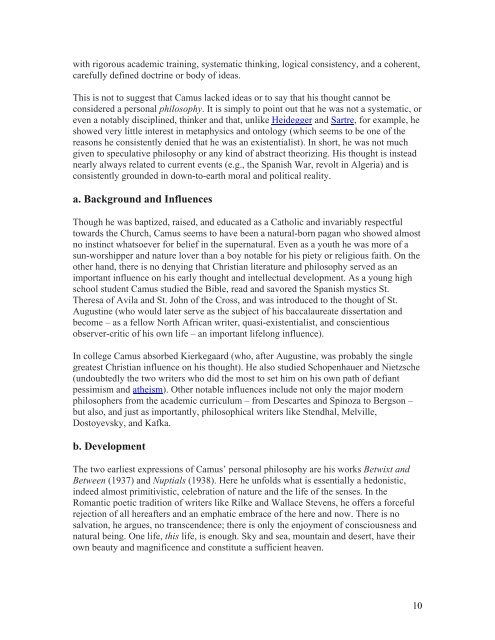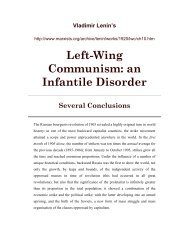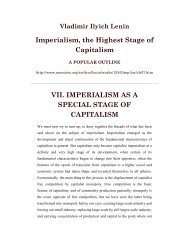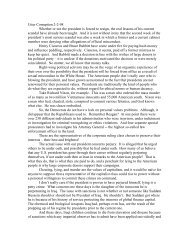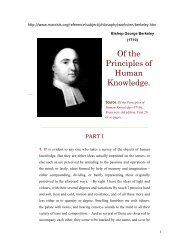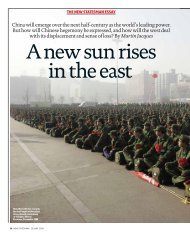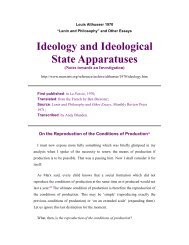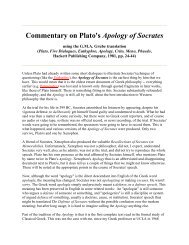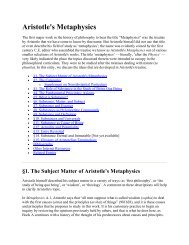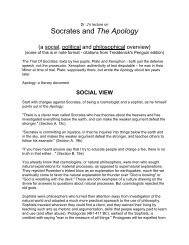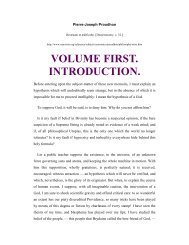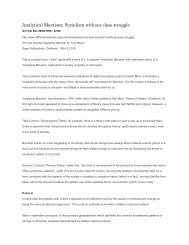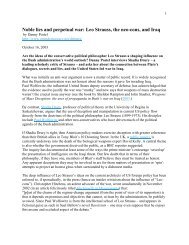Albert Camus (1913â1960) - Richard Curtis
Albert Camus (1913â1960) - Richard Curtis
Albert Camus (1913â1960) - Richard Curtis
Create successful ePaper yourself
Turn your PDF publications into a flip-book with our unique Google optimized e-Paper software.
with rigorous academic training, systematic thinking, logical consistency, and a coherent,<br />
carefully defined doctrine or body of ideas.<br />
This is not to suggest that <strong>Camus</strong> lacked ideas or to say that his thought cannot be<br />
considered a personal philosophy. It is simply to point out that he was not a systematic, or<br />
even a notably disciplined, thinker and that, unlike Heidegger and Sartre, for example, he<br />
showed very little interest in metaphysics and ontology (which seems to be one of the<br />
reasons he consistently denied that he was an existentialist). In short, he was not much<br />
given to speculative philosophy or any kind of abstract theorizing. His thought is instead<br />
nearly always related to current events (e.g., the Spanish War, revolt in Algeria) and is<br />
consistently grounded in down-to-earth moral and political reality.<br />
a. Background and Influences<br />
Though he was baptized, raised, and educated as a Catholic and invariably respectful<br />
towards the Church, <strong>Camus</strong> seems to have been a natural-born pagan who showed almost<br />
no instinct whatsoever for belief in the supernatural. Even as a youth he was more of a<br />
sun-worshipper and nature lover than a boy notable for his piety or religious faith. On the<br />
other hand, there is no denying that Christian literature and philosophy served as an<br />
important influence on his early thought and intellectual development. As a young high<br />
school student <strong>Camus</strong> studied the Bible, read and savored the Spanish mystics St.<br />
Theresa of Avila and St. John of the Cross, and was introduced to the thought of St.<br />
Augustine (who would later serve as the subject of his baccalaureate dissertation and<br />
become – as a fellow North African writer, quasi-existentialist, and conscientious<br />
observer-critic of his own life – an important lifelong influence).<br />
In college <strong>Camus</strong> absorbed Kierkegaard (who, after Augustine, was probably the single<br />
greatest Christian influence on his thought). He also studied Schopenhauer and Nietzsche<br />
(undoubtedly the two writers who did the most to set him on his own path of defiant<br />
pessimism and atheism). Other notable influences include not only the major modern<br />
philosophers from the academic curriculum – from Descartes and Spinoza to Bergson –<br />
but also, and just as importantly, philosophical writers like Stendhal, Melville,<br />
Dostoyevsky, and Kafka.<br />
b. Development<br />
The two earliest expressions of <strong>Camus</strong>’ personal philosophy are his works Betwixt and<br />
Between (1937) and Nuptials (1938). Here he unfolds what is essentially a hedonistic,<br />
indeed almost primitivistic, celebration of nature and the life of the senses. In the<br />
Romantic poetic tradition of writers like Rilke and Wallace Stevens, he offers a forceful<br />
rejection of all hereafters and an emphatic embrace of the here and now. There is no<br />
salvation, he argues, no transcendence; there is only the enjoyment of consciousness and<br />
natural being. One life, this life, is enough. Sky and sea, mountain and desert, have their<br />
own beauty and magnificence and constitute a sufficient heaven.<br />
10


